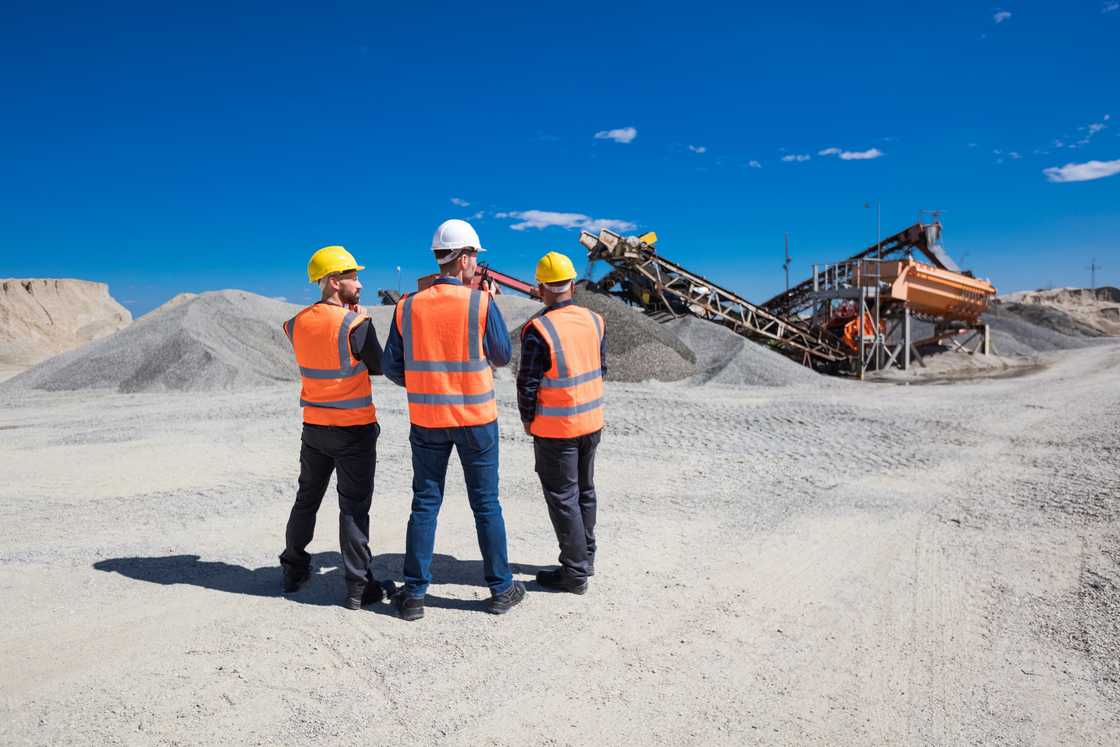What is a mining engineer's salary in South Africa? Average pay, roles and requirements
In South Africa, the average annual salary for a mining engineer is approximately R346,700, though it can exceed R1.5 million for highly experienced professionals. Pay varies significantly with experience, location, and specific roles.

Source: Getty Images
TABLE OF CONTENTS
Key takeaways
- The average annual salary for an experienced mining engineer in South Africa could be as high as R1.7 million.
- The salaries differ greatly depending on experience level.
- A mining engineer's responsibilities include mine planning, operations, safety, and technical management.
- To qualify as a mining engineer in South Africa, you typically need a relevant National Diploma or Bachelor's degree in Engineering.
What is a mining engineer salary in South Africa?
According to Payscale, the average annual salary for a mining engineer in South Africa is approximately R346,700. Other sources, such as Salary Expert also estimates their average annual salary to be around R720,000. These professionals reportedly pocket R346.89 hourly and get an average bonus of R26,480 yearly.

Source: Getty Images
What is mining engineer salary per month in South Africa?
The average monthly salary for a mining engineer in South Africa is approximately R36,930, though this can vary significantly based on role, location and experience, with entry-level positions starting lower and senior roles potentially earning much more.
Here is a detailed breakdown of mining engineer salaries in South Africa in 2025 by experience level.
Experience level | Years of experience | Average base salary |
Entry-level | Less than 1 year | R294,259 |
Early career | 1–4 years | R314,286 |
Mid-career | 5–9 years | R593,218 |
Experienced | 10–19 years | R1,047,619 |
Late career | 20 years and higher | R1,768,743 |
Highest paying cities near South Africa for Mining Engineers
Professionals in this field have different pay rates depending on location. As documented by Indeed, mining engineers in Pretoria, Gauteng earn significantly more than those in Johannesburg, Gauteng, due to demand and mining activity.
City | Province | Average annual salary |
Pretoria | Gauteng | R1,630,649 |
Witbank | Mpumalanga | R1,476,377 |
Phalaborwa | Limpopo | R1,132,002 |
Rustenburg | North West | R972,914 |
Kathu | Northern Cape | R904,424 |
Cape Town | Western Cape | R803,949 |
Gauteng | Gauteng | R573,724 |
Polokwane | Limpopo | R567,451 |
Johannesburg | Gauteng | R420,193 |
What is the highest-paid job in mining?
The highest-paid positions in the mining industry in South Africa are mainly senior management and highly specialised roles, with salaries often exceeding R1.5 million per year for top-tier executives and engineers.
Career | Average annual salary |
General Manager | R2.5 million to R3 million |
Senior Mining Engineer | R1.5 million and R2.2 million |
Senior Geologist | R905,000 to R1 million |
SHEQ Manager | R1.6 million |
Mine Manager | R2 million |
What is mining engineering?
Mining engineering is the field of engineering that focuses on finding, planning, and safely removing minerals like gold, coal, and platinum from the earth.

Source: Getty Images
What do mining engineers do?
A mining engineer's work typically involves planning, designing, operating and managing mines. Below are the common roles of a mining engineer:
- Finding minerals: They work with geologists to find the best spots to look for minerals, oil, or gas that are buried underground.
- Planning the mine: They design the entire mine layout, from the shape of the open pit to the tunnels in an underground mine.
- Ensuring safety: A top priority is keeping everyone on the worksite safe. They create and enforce safety rules and make sure equipment is not dangerous.
- Managing the job: They oversee the day-to-day work, which includes managing staff, equipment, and how much material is being dug up each day.
- Controlling costs: They make sure the project stays on budget by managing money and making sure resources are used wisely.
- Protecting the environment: They plan ways to minimise the damage to the environment during mining and how to fix the land after the mine closes.
- Picking the right tools: They choose the best machinery and equipment for the job, from massive haul trucks to powerful drills.
- Solving problems: If there is an issue with the mine's operation, they use their skills to figure out the problem and find a solution.
- Checking rock stability: They analyse the ground to prevent dangerous problems like rock slides or tunnel collapses.
- Writing reports: They create detailed reports and technical documents that explain the project's progress to managers and others.

Source: Getty Images
What are the mining engineering requirements in South Africa?
The minimum requirements for a mining engineering course vary depending on the university, as highlighted below:
University | Entry requirements |
University of the Witwatersrand (Wits) | –APS 42+ –Mathematics Level 5 (60% or above) –Physical Science Level 5 (60% or above) –English Home Language or First Additional Language Level 5 |
University of Pretoria (UP) | –Mathematics 70% –Physical Science 70% –English Home Language 60% OR First Additional –Language 70% |
University of Johannesburg (UJ) | –APS 31 –Mathematics Level 6 (70%) –Physical Science Level 6 (70%) –English Level 5 (60%) |
University of South Africa (UNISA – Diploma in Mining Engineering) | –National Senior Certificate (NSC) with diploma endorsement –Mathematics 50% –English 50% –Physical Science 50% |
Frequently asked questions
What is the average salary of a mining engineer in Johannesburg, South Africa?
As per Glassdoor, the average salary for a mining engineering in Johannesburg, South Africa is $396786 per year.

Source: Getty Images
What are the popular career paths for mining engineers?
Popular career paths for mining engineers include working as a mine manager, mine planner, geotechnical engineer, specialist consultant, or environmental professional.
Are mining engineers in demand in South Africa?
Mining engineers are in demand in South Africa because mining is very important to the country’s economy.
Conclusion
Understanding the mining engineer salary in South Africa is essential for those entering or advancing in the industry. While the average annual pay is approximately R346,700, compensation varies significantly based on experience, location, and specific roles.
DISCLAIMER: This article is intended for general informational purposes only and does not address individual circumstances. It is not a substitute for professional advice or help and should not be relied on to make decisions of any kind. Any action you take upon the information presented in this article is strictly at your own risk and responsibility!
READ MORE: Cybersecurity salary per month in South Africa
Briefly.co.za posted an article about how much cybersecurity experts earn in South Africa. Professionals in the field often deal with safeguarding digital company data to avoid breaches.
Threats to digital data security are on the rise due to modern tech developments like IOT, big data, and cloud computing.
Source: Briefly News





